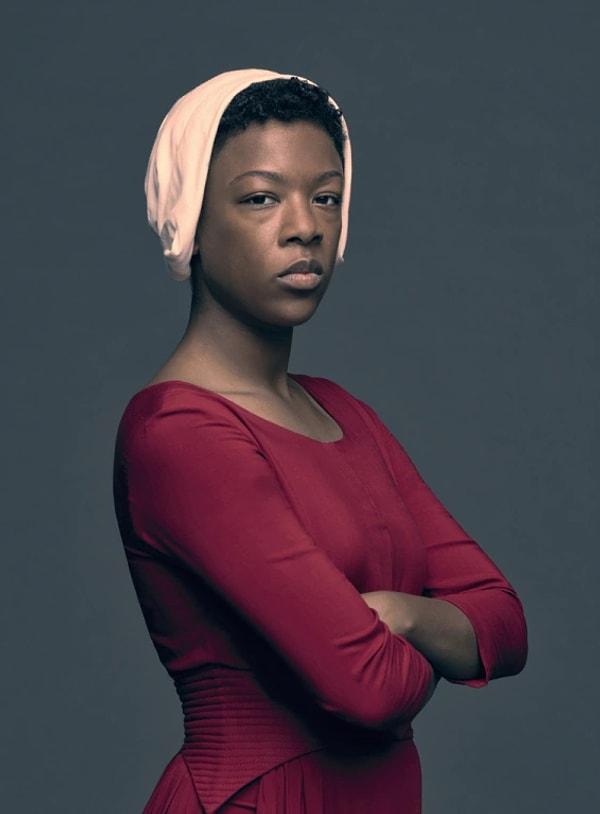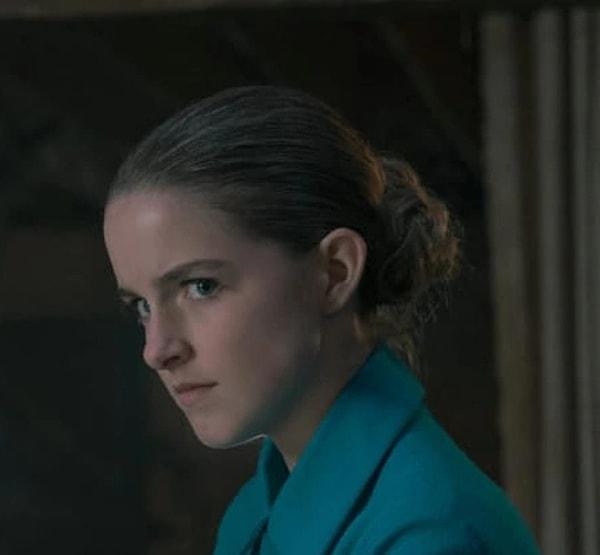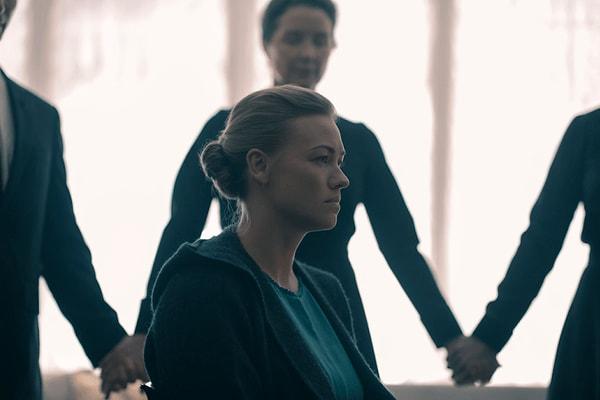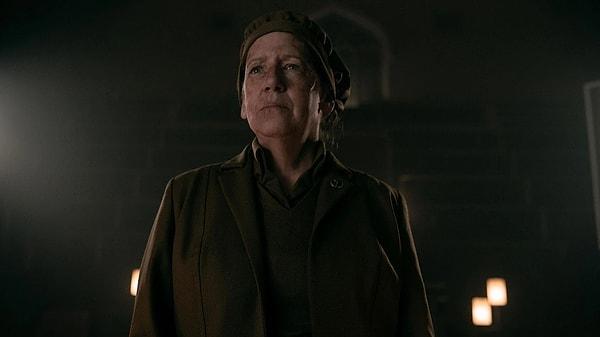Blood Tapestry: The Women of Gilead in 'The Handmaid's Tale
History is filled with the forgotten accounts of great women. Since the beginning of time, men have stolen their ideas, demeaned their intelligence, and built statues in their own image. Gilead excelled at this practice. Serena Joy Waterford, their philosophical founder, wasn't mentioned in any records after the fall of the regime. Historians speculated that her name might have been a parodical pseudonym, created by June when she made the audio cassettes recording her experiences as a handmaid.
It was the same with Aunt Lydia, a formidable political figure, credited as a founding aunt. Her picture hung in the back of every classroom. By the time the regime had fallen, and the world had moved on, there was very little proof of her existence. Historians knew the names of the Sons of Jacob and powerful commanders. But women's records were purged, burned in an effort to erase the crimes of men.
There's no way of knowing how many stories have faded, what those women's lives were like, or what they might have accomplished. They could have lit the first fire and invented the wheel, the bow and arrow, and the sword. Perhaps they created the first spyglass or ship sail. If the legacies of women like Lydia and Serena can be destroyed, anything is possible. It's time women were given the credit they deserve. Let's right countless wrongs, restore dignity and justice, and delve into the bloody tapestry of female life in Gilead.

Courtesy of Hulu
Rita Blue
Rita was enslaved, registered as a martha, and assigned to the Waterford household as personal property. Nobody knows how she got into that position. But it's possible that she was being punished for her late son Matthew's crimes after he fought for the Americans in the war.
It was the duty of the wife to oversee their martha's work. They had to ensure the quality of the food, the cleanliness of the laundry, and every other task Rita was commanded to perform. Serena would follow her around, beat her and harass her, critical of her every breath. If work wasn't done fast enough, she'd snap at her or fly into a rage. This left Rita traumatized, and she often struggled with the experience after she left Gilead.
Her life was a never-ending cycle of short nights, hard labor, and the promise of an early death. If at any point she was deemed defective and unfit to keep working, the guardians would come and kill her. At first, she resented her role. She never had a second to sit, think, and be alone. It would've been easy to find a kitchen knife or a bedsheet and end it all, and it probably would have been better than the alternative. Eventually, she started to internalize Serena's abuse and shame, robbing her of her self-confidence. She added a dash of love to everything she did, and she allowed Serena to confide in her. They talked about Serena's marital issues, her insecurities, and concerns--all of the petty squabbles she had with Fred, and Rita started to care. That was the start of her Stockholm syndrome. Work became habit and then compulsion, and an abusive master/slave dynamic turned into an unhealthy friendship. This way of being was so ingrained in Rita that when she finally did leave Canada, she couldn't help but wipe countertops and serve her friends. She was robbed of her self-agency, transformed by Gilead's oppressive system, and forced to meet with a psychologist. In a way, she never stopped being a slave. She carried her shackles around wherever she went.
Rita's Future: Rita stayed behind with Moira in Canada. In the first epilogue we learned that Canada started expelling refugees and sending them back to Gilead. Rita could end up in the colonies if she's not careful.

Courtesy of Hulu
Moira Strand
Moira climbed out of the womb with a middle finger raised up to the sky. She was a proud lesbian and a gender equality activist, who learned to program when she was in college with June. Later she went on to design websites and work with radical feminist collectives. When the country started changing, she knew the religious right was responsible, and she wasn't surprised. Unlike June, she saw it coming a mile away. That didn't mean she was prepared, though.
From the moment she got to the red center, she was a rebel, quiet and calculating, always hunting down ways to act out. She'd carve messages in the bathroom stalls with a sharpened toilet rod and hold secret meetings with June. She eventually managed to escape by holding Aunt Elizabeth hostage and stealing her clothes. When she walked outside, she was shocked by what had happened to the country. The buildings were gone. The roads were torn away, and there were guards everywhere. It was like a parallel universe. It was intimidating.
She found a quaker safehouse and showed up at their door dressed as an aunt. They were startled, but they were able to get her in touch with the underground femaleroad. Her courier was caught and killed, and she was captured before she could escape. That experience quelled her rebellious spirit--dimming the essence of her persona. She was sent to Jezebels, where June found her wearing a ridiculous pair of bunny ears. At that point, she was convinced that there was no way out. She told June to obey. June repeated Moira's words from the red center back to her. She told her to get her shit together. They were going to get Hannah, and they were going to leave. Inspired by June's bravery, she sharpened another toilet rod, killed one of the commanders, and stole a truck. At the end of season one, she made it across. But the fire inside her had been snuffed out, and it was never reignited. She became complacent. She put everything behind her and shunned those who continued fighting, calling them shell-shocked refugees. She believed that she was on the right path, seeing a therapist and helping to facilitate support groups. But she didn't understand the vicious, authoritarian nature of the world she lived in. She wanted to pretend that she was in the time before. The people that survived refugee status in Canada were prepared, ready to leave, or well-connected and capable of finding fake papers.
Moira's Future: Moira has made contact with Mayday. It's possible that she may find a way to go underground to avoid expulsion from Canada.

Courtesy of Hulu
Esther Keyes
Esther might have been an unbeliever, but she was still one of the most dangerous characters in the show. It was in her eyes, a cold, bitter glare, sharpened by years of fury and abuse. Like most girls in Gilead, she was married off as soon as she started menstruating. She was no more than 13 or 14 years old when we met her, but she had already been with Commander Keyes for some time.
He couldn't perform in bed, but he wanted children. So he brought in other men--guardians, eyes, and commanders--anyone and everyone willing to violate a child. They were merciless. They taunted her and used dirty talk. One guardian, Johnny Pogue, who she later killed, liked it when she said his name. The unsettling, sadistic nature of their sexuality built up, feeding her rage. She started poisoning her commander slowly with nightshade berries, causing him to go senile. She turned her farm into a bastion of freedom and began having fantasies of killing her abusers.
She had a taste for murder. She was ruthless, and she didn't have any of the inhibitions that come with a fully mature brain. If she craved blood, she would see it spilled. She even had fantasies about overthrowing Gilead with June. She thought God brought them together.
Esther's Future: Esther will not allow herself to conform to her role in Gilead. She already tried to kill herself after Putnam violated her. Now she's pregnant, and they're saying she'll be strapped to a hospital bed until she has the child. There's a chance that Lydia will find a way to help her, but she's probably going to have a very difficult time.

Courtesy of Hulu
Emily Malek
Emily was a victim, but she was never going to allow herself to be defined as such. It started during her career as a biology professor at Harvard. When she was advising one of her students, they spotted a picture of her wife Syl and their son Oliver on her phone. The word got out that she was a lesbian, and the administrators decided that they didn't want her teaching. Emily refused to listen. She planned on doing it no matter what they said. At that point, she was naive, still clinging onto her belief in a modern world where members of the gay community were treated like equals. That changed after she found her coworker hanging from a school building.
Like many great minds, Emily was far too smart and far too self-aware to fulfill her role as a handmaid. People like her can't be caged, because they won't accept their confinement. Their minds will race, causing anxiety and depression. They can't be indoctrinated, so they'll never be comfortable. They'll live their lives perfectly aware of what's going on around them, and in a world as bleak as Gilead, that's highly distressing. She'd find little ways to toy with her oppressors or make them pay. Lydia operates by trying to get a reaction out of the girls, so she can twist the things they say or punish them if they speak out. She could handle rebelliousness, complacency, and devotion. But Emily would just stare at her blankly. She wouldn't respond, and it drove Lydia up the wall. She joined Mayday, gathered information, and helped pass along orders from the rest of the group. She was a valuable operative until she was punished for having an affair with a martha.
She was given a clitorectomy and forced to watch the martha die. After that, she changed from a quiet, pensive young woman into a straight-lipped killer, so consumed by her fury that it came wafting off the screen in sharp waves. It was always inevitable. She could never be satisfied. She couldn't forget everything and just go through the motions. She couldn't function without freedom and justice. That's why she stole a car and ran over a guardian, and it's why she killed a wife when she was sent to the colonies. She wasn't just angry. She was bigger than the world that confined her, and she didn't belong there. Had she not stabbed Aunt Lydia and escaped, she probably would've been executed for some other crime. It was her greatest flaw, and also her greatest asset. In the end, she was a fighter.
Emily's Future: The actress who played Emily, Alexis Bledel, announced that she would be leaving the series. In the beginning of season 5, June found out that she ran back to Gilead to go after Aunt Lydia. She won't survive. We've seen the last of Emily Malek.

Courtesy of Hulu
Serena Joy Waterford
Serena operates in a tiny, narcissistic bubble. She only reacts to things that hurt her or the very few people that she cares about, not the pain of those around her. Even when she does see the world for what it is--the suffering, the lack of human decency, and slavery--she refuses to admit it to herself. It's easier that way. If she had to lean into uncomfortable truths, she'd have to question her beliefs and accept that she played a part in building the most horrific regime in human history. She doesn't do anything uncomfortable. She pads herself, moving from one mistaken attachment to the next, struggling to fill the gaping hole where her heart should be. In a way, she's like an addict, self-medicating with anything she can find, because she's too crazy and far too lonely to function alone.
If we really want to understand her, we have to go back to a time when she couldn't ignore the state her life was in. That was after she gave up Nichole in season two. She hated everyone and everything, so she decided that she needed a baby. When her finger was cut off, and she gave the child up, she realized that she couldn't continue to live the life she was living. So she burned her home to the ground and went to stay with her mother, Pamela.
Pamela looked like a cross between a spider in human clothing and a shriveled version of her daughter. She used her prayer group to pressure Serena into going back to her husband, and when that didn't work she shamed her. Serena came to her begging for her to listen. She needed her to understand the way things were with Fred. She was almost hysterical, and Pamela had this saccharine way of sweeping her concerns under the rug, offering her pumpkin soup over and over again. It became clear that this was a problem in the household. Pamela didn't want her child to have emotions, so Serena acted out, throwing fits. It's probably how she developed her compulsion for tantrums. It was a way of compensating for her need to be heard. Finally, Pamela told her that she didn't care what things were like with Fred, who beat her and cheated on her. She said that there was no place in this world for Serena without him. This must've been the origin of Serena's twisted misogyny, which she later used to develop Gilead's philosophical foundations. When Serena was forced to see that misogyny playing out in her life she couldn't accept it. But she had nothing to say about handmaids, marthas, and the colonies. Even in season five when she was held prisoner by the Wheelers, she was still eager to promote Gilead. That hasn't changed. What has changed is the amount of suffering that she has faced and how badly she wants peace in her life.
Serena's Future: Serena is on a train headed west. After that, she's supposed to take a plane to Hawaii. Most journeys get cut short in this franchise, and they rarely leave their Canadian filming locations. If she does get coconuts and treason, we probably won't see it. It's likely that she will end up in some sort of crisis with June.

Courtesy of Hulu
Janine Lindo
We rarely hear about this, because it's not something that cults advertise. Sometimes when people visit their meetings, something--some hidden mechanism, devised through either nature or nurture--clicks inside their heads, and they begin to hallucinate. Usually, they'll be escorted out quietly to avoid embarrassing conversations with the followers. But in Gliead, they just let it happen. They didn't care if their breeding stock hallucinated, so long as they were safe to be around. This can also occur after traumatic events. With Janine, it was a combination of both. Her psychotic break was one of the most disturbing scenes in the entire show, along with the blame circle that caused it. But she isn't crazy. REPEAT: Janine isn't crazy. She tells people that all the time, and nobody listens to her. Yes, her experience did seem to affect her. She became childish and impressionable, even a little pouty. That would probably stop if she left Gilead. It's not a sign of chronic illness. It's not schizophrenia. It's a normal occurrence, and many people have at least one like it throughout their lives.
We didn't really meet Janine until season four. We saw her innocence and purity--the power of her faith, and her ability to bring cheer to others, even in the colonies. At that time, she was still recovering from what happened to her. She didn't come back to her normal self until she snuck into a train cart with June. She told June about how strong she was--and she was strong. Any single woman who can raise a child on a waitress's salary is more capable than most realize. She's also perceptive. She knew that June had confessed the location of the other handmaids after being tortured, and she saw the way June kept her in the dark about everything. She was perfectly aware of what other people thought of her, and she hated it. She was constantly trying to prove herself. It was an unfair bias, based on a superficial understanding of mental health, and everyone was guilty of it.
Years later, when the series ends and the spin-off has run its course, some audience members will look back and realize the impact that Janine had on the world. Her greatest asset is her ability to inspire love in others, and the effect she has had on Lydia will have long-lasting ramifications.
Janine's Future: Lydia could have Lawrence shot within 12 hours of Janine's arrest. The high commanders would rule against him if she proves his crimes. She'll probably threaten him within the first fifteen minutes of the next episode, and Janine will be returned to the red center safely. Aunt Lydia will be creating a program called the Pearl Girls. They're missionary aunts in training, and she will use that program to smuggle girls out of the country. She would never leave Janine in Gilead while helping others. Janine would be the first to go.

Courtesy of Hulu
Aunt Lydia
To become an extremist, you must care about finding the truth and doing the right thing. That's a radical statement, but nobody would put in the effort otherwise. They'd have to be eager for understanding to eat up those lies and just as eager to help to act on them. Lydia was born during a time when Sunday service was an obligation and your identity--your politics, your way of living, and the things you believed--were tied in with your chosen sect. Her beliefs were reinforced regularly over a period of decades. She'd give her all in praise and worship sessions, singing, clapping, closing her eyes with her hands raised in the air. The music would begin slowly at first, while the band began to wake the crowd up from their morning stupor. Then the tempo would increase, and they'd get into it, shouting, jumping up and down, crying out with joy. Soon the pace would slow again, and things would get serious. People would start the cry, and the lyrics would get more intense. There's a science to that type of performance. It's meant to work the congregation up then break them down, and get them ready for the message ahead. It is brainwashing, but it's not framed as such. It's how pastors are taught to reach their flock.
Eventually, the message would get more urgent, serenaded at first with piano music, then synthesizers, and eventually recorded tracks. It was meant to elicit a certain reaction, like sadness, or a revelation. Things would get political. They'd talk about the evils of moral decay, abortion, homosexuality, the fertility crisis, and global warming. They would announce that they wanted to change the country and bring it back to God. Services would get longer, and all sorts of volunteer opportunities and groups would spring up, meant to support what would become a very real revolution. It's easy to see how a woman of Lydia's age could be fooled by all of this, especially if they were raised in the church and told their entire lives that it was the source of all goodness and light. She would've eaten up every word, and she did. She wanted to get involved. She wanted to do the right thing, which gradually morphed into becoming an aunt, beating up a certain type of woman, and forcing them to take part in the ceremony. She was just like June, a frog in a boiling pot of water. She didn't see the danger or the corruption until it was too late.
When she did start to change, after June confronted her about the abuse against handmaids, it was hard to tell whether or not she was fully aware. But Ann Dowd, the actress who plays her, recently talked about it in an interview. She said that Lydia was very perceptive. She knew Putnam was killed for political reasons. She saw everything the commanders had been doing, including the corruption, what she'd consider blasphemy, and their lies. She didn't like any of it. She might not have been aware at first that she was a glorified madame, but you can bet she'll do something to remedy that.
Lydia's Future: Lydia doesn't like having the eyes at the red center without her permission. She will probably have them banned when she threatens Lawrence into releasing Janine. The new spin-off, 'The Testaments,' will air after the series finale, and it will center around Lydia's actions 15 years in the future. This article will not reveal her secrets, but know that she is cunning and capable--a rare type of human that we only see once in a generation. There is nothing she can't do if she puts her mind to it, and she will.

Courtesy of Hulu
June
At first glance, June might not seem special, but she's really a master manipulator. She told Fred everything he wanted to hear and wrapped him around her finger, almost to the point where he'd fallen in love. She earned Serena's respect and loyalty, giving her the leverage she needed to get Nichole out. She was even able to appeal to the humanity of the man who constructed the colonies.
Bradley Whitford, who plays Commander Lawrence, said that the magic of her character was her ability to bring out the decency in others. That was part of it. But there was a reason she left so much destruction in her wake. She had a nose for weakness. She'd grab believers by the scruff and rub their noses in it until they couldn't lie to themselves any longer. That's why Lawrence was willing to get her to Canada, and it's why Serena burnt their house to the ground. She wouldn't leave either of them alone. She said all the right things over and over again, and it worked. That was more than decency. It was awareness--something that Gilead strongly lacked.
She's also quite powerful when she puts her mind to something. When she finally decided that she had nothing to lose, she inspired people across Gilead by kidnapping dozens of children and shipping them off to Canada. People saw her courageous, balls-out attitude, and it turned her into a symbol for rebellion, liberating the hearts and minds of the oppressed. She became the anti-Gilead, enemy number one, and she had all of the traits they loved to hate. She was loud-mouthed, opinionated, blasphemous, and heretical. She wouldn't do what she was told. She never compromised her morals, and she rarely lied about her beliefs. The country wasn't the same when she left, and neither were any of the people she came into contact with.
June's Future: In the second epilogue, there were two known assassination attempts against June, both of which failed. She went to work for Mayday at a base in Ontario. Not much is known aside from that, and it was 15 years after the events in the series. Anything could happen to her in the years between. Nobody knows how the series will end. But we just learned from showrunner Bruce Miller that her story will play a bigger part in 'The Testaments' than was recently anticipated. Let's hope she does some serious damage. Maybe she'll play a part in the final battle.
Never to Be Forgotten
In the original novel, June was never named. Everything she was--her former life, her loved ones, and her identity--had been stripped from her, and she was known only by her patronymic, Offred. It was the same for all other handmaids. When they left or they died, someone else would come in their place, almost as if they had never been born. This is a tribute to those women. May they never be forgotten.
Alma. Brianna. Crystal. Danielle. Dolores. Erin. Greer Ladestro. Lillie Fuller. Maria Navarro. Natalie. Ofjohn. Ofgeorge. Ofcharles. Ofandy. Ofmiles. Ofklye. Ofwyatt. Oftucker. Oftim. Ofthomas. Vicky.
Keşfet ile ziyaret ettiğin tüm kategorileri tek akışta gör!

Send Comment